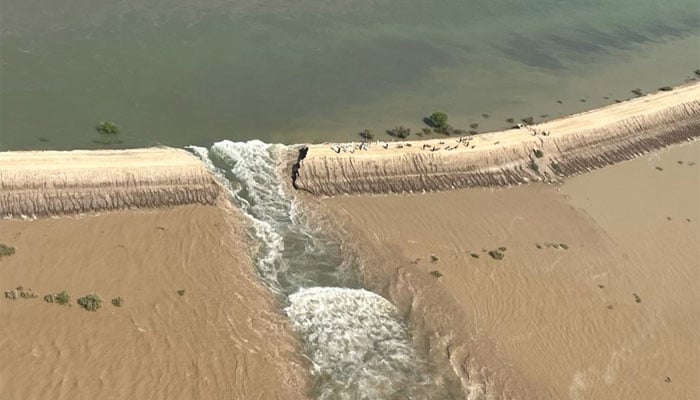
- Irrigation minister says water level in Manchar Lake hadn't receded despite controlled breach made on Sunday.
- Says pressure in Dadu, Khairpur Nathan Shah and Mehar would ease after new cuts.
- Lake water inundates hundreds of villages along Indus Highway.
The embankment at Manchar Lake was breached at two more points to lower the reservoir's water level which remained dangerously high, posing a threat to adjoining areas.
The new cuts were made near the RD-50 and RD-52 points in Pakistan's largest freshwater lake.
Nearly a third of Pakistan is under water -- an area the size of the United Kingdom -- following months of record monsoon rains that have killed 1,300 people and washed away homes, businesses, roads and bridges.
Manchar Lake, which lies west of the Indus River, varies in size according to the season and rainfall, but is currently spread over as wide an area as anyone can recall.
Sindh Irrigation Minister Jam Khan Shoro said the water level in the lake had not receded despite a controlled breach on Sunday. However, the pressure in Dadu, Khairpur Nathan Shah and Mehar would ease after the new cuts, he said.
Meanwhile, water from the lake inundated hundreds of villages along the Indus Highway near the Sehwan toll plaza and Bobak-Sehwan link road. Hundreds of people were trapped in their houses in Jaffarabad and Wahar union councils. Authorities concerned have directed the administration to evacuate people.
Reports said that heavy pressure in the MNV drain had put thousands of people living in Dadu at risk. The water is one foot below the dam of the MNV drain near Kari Mori. Machinery has reached Kari Mori to strengthen the drain.
The 2.5 times increase in the volume of the assistance programme has been made in view of damages to infrastructure and crops in the wake of flash floods.
'Unprecedented loss': PM Shehbaz Sharif
Speaking to people during his visit to a relief camp, Prime Minister Shehbaz Sharif said the country had faced unprecedented loss due to floods and mentioned that Rs25,000 in compensation was being given to each flood-affected family.
In the meantime, the Lahore Chamber of Commerce & Industry will build a model village of 100 houses in collaboration with the Provincial Disaster Management Authority (PDMA) besides spending a huge amount to buy tents and goods for the flood-affected population.
“Over Rs100 million will be spent for the rehabilitation of people devastated by floods,” said LCCI President Mian Nauman Kabir, who led a delegation which called on PM Shehbaz Sharif.
The premier said that the role of the business community in the rehabilitation of flood victims was very important. He thanked the Lahore Chamber of Commerce & Industry for the donation and sharing the burden of the government. The Founders Group of the LCCI, of which the PM is a member, provided a sum of Rs30 million for flood victims separately.
'Nowhere to shower or go to the bathroom'
Officials say the repair bill will top $10 billion for a country already in the grip of economic crisis, with hundreds of thousands homeless as the monsoon draws to an end and winter approaches.
"There is nowhere to shower or go to the bathroom," said Zebunnisa Bibi, sheltering near Fazilpur, in Punjab province, where 65 tents are now home to more than 500 people who fled their inundated villages for higher land.
Similar tent camps have mushroomed across much of the south and west of Pakistan, where rain has nowhere to drain because rivers are already in full flow as a result of torrential downpours in the north.
Sindh province Information minister Sharjeel Inam Memon told AFP Monday that engineers had to cut a channel into Manchar Lake to drain water that was threatening the towns of Sehwan and Bhan Saeedabad, with a combined population of nearly half a million.
Lake Manchar bigger than ever
Still, thousands had to be evacuated from smaller settlements submerged by the newly directed channel.
"The flood water was diverted but the threat is still far from over," Memon said.
"We are trying our best to stop the inundation of more villages."
Much of Sindh and parts of Balochistan have become a vast landscape of water, with displaced locals huddled miserably on elevated roads, rail tracks and other high ground.
Human and animal waste in the fetid water attracts swarms of flies, while outbreaks of dengue are being reported from mosquitos breeding in the swamplands.
One pregnant woman at a camp in Punjab said she was desperate for medical attention for a baby due any day now.
The mother-of-five knows it could be a difficult birth, as the baby has not shifted from the breech position.
"I need a doctor or a midwife. What if something happens to my child?" said Fahmidah Bibi.
The United Nations Population Fund said at the weekend there were at least 128,000 pregnant women in flood-hit areas who urgently need care -- with 42,000 expected to give birth in the next three months.
Climate change blamed
Pakistan receives heavy -- often destructive -- rains during its annual monsoon season, which are crucial for agriculture and water supplies.
But such intense downpours have not been seen for decades.
Pakistani officials blame climate change, which is increasing the frequency and intensity of extreme weather around the world.
A massive army-led relief operation is in full swing, but the country's leaders have admitted being overwhelmed by the scale of the crisis and appealed for international help.
The latest figures from the National Disaster Management Authority show nearly 6,000 kilometres (4,000 miles) of roads have been washed away, 246 bridges demolished, and 1.6 million homes either destroyed or badly damaged since June, when the monsoon started.
With additional input from AFP



0 Comments